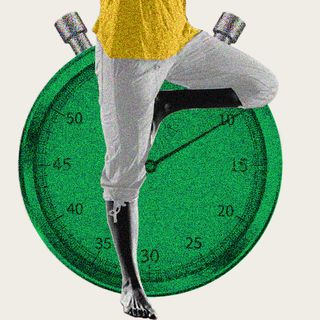
New Research Shows Most People Don’t Want to Be Billionaires
A study challenges the idea that all people are programmed to desire more, which may hold important implications for the planet.

If there is one universal truth that people may seem to agree on, it’s one about wealth: everyone wants it, only some have it, and very few have most of it. This has been the bedrock of modern society. Everything from economic policies to consumerism spawns from the idea that people will always have unlimited wants, and the world must tarry to cater to those.
That may not be quite the case. A new study, published in Nature Sustainabilitylast week, suggests that only very few people desire to join the elite ranks of the billionaire club.
This goes against every fiber of what we intuitively believe. Surely, money and financial prosperity are extraordinary things. But the new study challenges the economic premise of unlimited desire: that people are programmed and motivated to always keep wanting more, which explains our consumerist and exploitative patterns. If this is indeed untrue, if money isn’t the end-all and be-all for every person, there is scope for reimagining economic, welfare, and sustainability policies.
“Humans have unlimited wants. This foundational economic principle and widely accepted assumption about human nature poses considerable challenges to addressing sustainability because pursuing wealth and economic growth to meet unlimited wants increases resource use and pollution,” the study noted. In other words, economic and behavioral theories have long argued that people will adjust and adapt to the current wealth levels, and consequently, always desire more possessions and wealth.
But, here lies evidence “that this principle is not universal, and actually applies only to a minority of people.”
To show this, researchers conducted a cross-cultural examination of people’s ambitions. To 8,000 people spread across 33 countries — including India, the U.S., the U.K., China, Saudi Arabia, Vietnam — they asked how much money they want to achieve their “absolute ideal life.” Factor in everything — the food, home, transport, vacation, the start and end of every luxury. The limits of imagination were put to test: In 86% of countries, most people said their dreams were possible with $10 million or less (roughly Rs. 78 crores), and in some countries, people were content with $1 million (roughly 7 crores). Both are huge sums of money, but they represent the ideal accumulation of wealth over a whole life period.
To put this in perspective: 86% of the participants didn’t even factor in wealth in billions.
Related on The Swaddle:
When Money Can — and Can’t — Buy Happiness, According to Research
Stretching this a little further, $200 billion (which is the net worthof the world’s richest person who very recently wanted to purchase Twitter) is enough to sustain more than 200,000 people’s ideas of their desired lives. What also sets apart the current findings is the sheer geographical scope: countries like Saudi Arabia, Uganda, Tunisia, Nicaragua are rarely factored in when abstracting theories about wealth and behavior.
What of the people who wanted as much money as they could get? They accounted for about 8 to 39% of participants according to the country. People who did have unlimited wants tended to be younger, living in cities, and who aligned their values with success and power. Interestingly, this section of people majorly lived in countries that are collectivistic in nature (like India, where the focus is more on groups rather than individual well-being) and are more accepting of inequality. The findings then make sense: people are more likely to desire ridiculous amounts of wealth in societies where the chasm between the “haves” and “have-nots” is very deep.
The findings then call for a rethink of two patterns the free market and much of our modern lifestyle are built on: consumerism. “The ideology of unlimited wants, when portrayed as human nature, can create social pressure for people to buy more than they actually want,” explained Paul Bain, professor at the Department of Psychology at the University of Bath and lead author of the study. “Discovering that most people’s ideal lives are actually quite moderate could make it socially easier for people to behave in ways that are more aligned with what makes them genuinely happy and to support stronger policies to help safeguard the planet.”
In important ways, the findings reframe what is the majority opinion around wealth and quality of lifestyle. According to co-author Renata Bongiorno of the University of Exeter and also Bath Spa University, “if most people are striving for wealth that is limited, policies that support people’s more limited wants, such as a wealth tax to fund sustainability initiatives, might be more popular than is often portrayed.” In other words, most people desire enough wealth to sustain themselves through life, and not excessive amounts of wealth that are inevitably accumulated by cronies of capitalism. This realization, simple but sobering, could go a long way in shaping social welfare, economic, and climate action policies.
Saumya Kalia is an Associate Editor at The Swaddle. Her journalism and writing explore issues of social justice, digital sub-cultures, media ecosystem, literature, and memory as they cut across socio-cultural periods. You can reach her at @Saumya_Kalia.
Related


Why Trying To ‘Control’ Your Partner Into ‘Opening Up’ Doesn’t Work
